Many people take an iron supplement to help improve energy levels and prescribed to others with iron deficiencies.
Iron is an essential nutrient that supplies the building blocks for red blood cells, which transport oxygen from your lungs to the rest of your body.
If your iron levels are low–as they are for a huge swath of the population–you can suffer fatigue, reduced aerobic fitness, and a host of other negative side effects.
This is where iron supplements come in. An iron supplement can deliver a concentrated dosage of iron, ideally in a highly absorbable form, to rectify your low iron levels.
However, not all iron is created equal. Some forms of iron are better absorbed than others, and some forms are less likely to result in negative side effects.
Our researchers looked into the iron supplements on the market and identified the best.
Research
Rankings
1. Solgar Gentle Iron
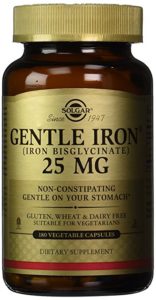
Solgar’s iron supplement distinguishes itself by avoiding the common ferrous sulfate form you’ll find in many other iron supplements.
Ferrous sulfate is an inexpensive and effective form of iron, but many people find that it causes constipation, stomach cramping, or other gastrointestinal side effects. Solgar’s bisglycinate iron should help avoid this.
2. Proferrin ES
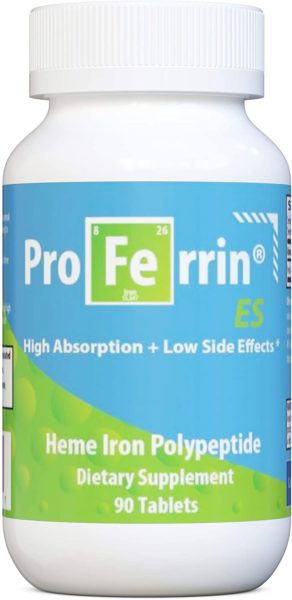
If you have chronically low iron that has not responded to other supplements, Proferrin ES is the way to go.
It provides its iron in “heme” form, meaning its ability to be absorbed should be vastly greater than a mineral form iron supplement like ferrous sulfate.
The only downside of Proferrin ES is that there is less research on its actual efficacy; while all the biochemistry literature supports the claim of increased bioavailability of heme form iron, the actual clinical work is still being done.
3. Ferretts Iron Supplement
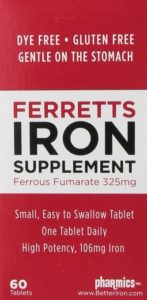
Ferretts Iron Supplement is a good choice if mainstream ferrous sulfate supplements are causing too many side effects for you.
While this is still a mineral salt form of iron, Ferretts provides ferrous fumarate instead of ferrous sulfate. You may find that your stomach handles this better than the ferrous sulfate in other brands.
Another attractive aspect of Ferretts Iron Supplement is its lack of fillers and artificial coloring agents.
4. Thorne Research Iron Bisglycinate
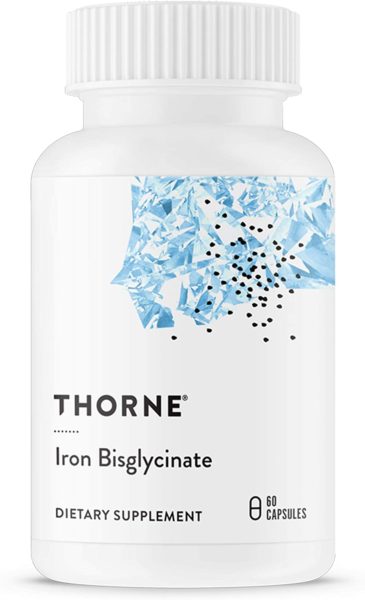
Thorne Research is known for providing straightforward, no-nonsense supplements, and that’s exactly what they deliver with their iron supplement.
It’s in the chelated bisglycinate form, which means it’s great if normal iron supplements give you constipation, cramping, or stomach pain.
The only downside is that the dosage per capsule is lower, so if you are seriously deficient, you’ll need to take a lot of pills.
5. Nature Made Iron
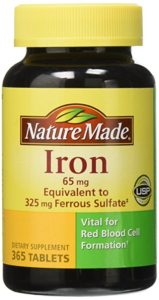
While Nature Made provides an easy and simple ferrous sulfate supplement that’s extremely popular, they make the curious choice of including a small amount of calcium in the formulation.
Calcium is a well-known inhibitor of iron absorption, so while the actual amount is pretty small, it’s still puzzling why they’d bother to include it.
6. Vitron-C
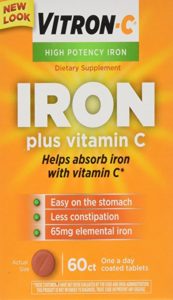
Vitron-C takes advantage of the fact that vitamin C boosts the absorption of iron when consumed in a supplement. Each supplement contains 200% of your recommended daily intake of vitamin C.
Unfortunately, all of the absorption benefits of the vitamin C is likely offset by the fact that the iron is delivered in “reduced” form–it’s just small flakes of metallic iron that make up the iron content of the supplement.
7. Feosol
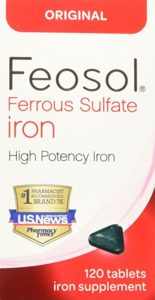
Feosol was one of the original and most popular iron supplements, but it’s starting to show its age. While the iron dosage is high, and the ferrous sulfate form is a simple and straightforward way for many people to get the iron they need, there are a lot of extraneous ingredients.
Do you really need several different artificial coloring agents and polymers in a lowly iron pill?
8. Garden of Life Vitamin Code Raw Iron
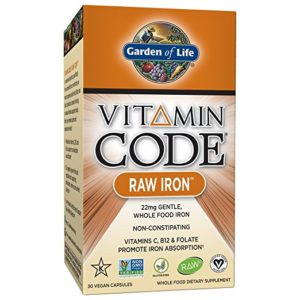
Garden of Life’s trademark strategy is to provide vitamins and minerals in their raw, natural form, ideally from powdered, dried fruit and vegetable concentrates.
Usually, this is a great idea. However, in the case of iron, research into the bioavailability of iron has discovered that the same kinds of compounds that give fruits and vegetables their overall health benefits are also responsible for markedly lowering the absorption of iron, when consumed at the same time.
9. New Chapter Iron Food Complex
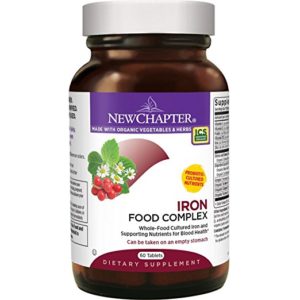
Taking a page out of the Garden of Life playbook, New Chapter mixes its iron supplement in with over a dozen other herbal and vegetable ingredients.
It faces the same problem as Garden of Life’s iron supplement: many of these naturally-derived compounds actively inhibit iron absorption, so the relatively limited iron content of the supplement (only 50% of your daily recommended intake) will be diminished even further.
Finally, while the iron in the supplement is “culture derived,” it’s still just ferrous fumarate, a mineral salt form of iron.
10. NovaFerrum Liquid Iron
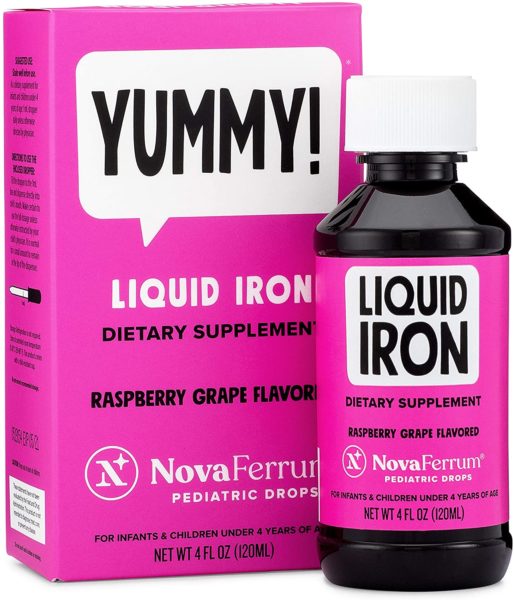
NovaFerrum provides an alternative to capsules and pills if you truly abhor taking them, but there are a number of disadvantages of liquid iron.
First, you can’t accurately determine the dosage, and second, NovaFerrum provides its iron in an unusual polysaccharide form of iron with unknown bioavailability properties.
While it’s great for kids who need iron supplementation, adults taking iron have better options.
Category winners
Best iron supplement overall: Solgar Gentle Iron
Solgar Gentle Iron provides a solid dosage in an easily digestible format that’s not too hard on your stomach. For general-purpose iron supplementation, this should be your first choice.
Best iron supplement for women: ProFerrin ES
Women can have a harder time both absorbing iron and retaining it in their system. ProFerrin provides “heme” form iron, which is the most highly bioavailable format available, making it our recommendation for women with low iron.
Best iron supplement with vitamin C: Vitron-C
Vitamin C is a potent booster of iron absorption, and Vitron-C combines them into a single supplement. If you don’t want to bother with a separate iron and vitamin C supplement, Vitron-C is the way to go.
Best iron supplement that won’t cause constipation: Solgar Gentle Iron
While the most common form of iron used in supplements is ferrous sulfate, it has a tendency to cause constipation. Taking a fiber supplement alongside your iron supplement can help, but an even better option is using an iron supplement that uses bisglycinate form iron like Solgar Gentle Iron, which is less likely to cause constipation.
Best heme iron supplement: ProFerrin ES
If you aren’t responding to normal iron supplements, give ProFerrin ES a shot—the heme format of iron is absorbed far more effectively than the ferrous sulfate or ferrous bisglycinate formats.
Best iron supplement for endurance athletes: Solgar Gentle Iron
Low iron can cause poor performance in endurance athletes, like runners, cyclists, and Nordic skiers. Solgar Gentle Iron is a great option for boosting iron, as its dosage is high and the specific format of iron it uses (ferrous bisglycinate) is less likely to cause gastrointestinal problems.
Who should buy iron?
Iron is an essential mineral whose best-known and (perhaps) most important function is to serve as the basic building block for hemoglobin, the protein that makes up red blood cells. Red blood cells can only carry oxygen thanks to the ability of iron, incorporated into hemoglobin, to bind to oxygen.
As you might guess, people who have anemia (a low level of hemoglobin in their blood) are often deficient in iron. Iron intake is especially important whenever your need for red blood cells is elevated—this occurs in women who are pregnant, because their body needs to supply blood for their baby, and it also occurs in endurance athletes who are training hard.
In this case, the cause is different, but the result is the same: the body needs more iron to synthesize an adequate amount of red blood cells. These same requirements apply to blood donors and women with heavy menstrual bleeding, for all of the same reasons: these situations also require more red blood cells to be synthesized, and thus, more iron intake.
Some people might be getting iron from other sources (like women who are pregnant, who may get iron from their prenatal vitamin), but often, these sources can be inadequate: if, for example, a multivitamin for women provides high levels of calcium, the bioavailability of iron can be seriously hampered.
Iron isn’t right for everyone, and you shouldn’t take it if you aren’t sure if you have an iron deficiency or not. That’s because there is a genetic condition, called hemochromatosis, which causes your body to retain much more iron than usual.
About one in 200 people in developed countries have the gene for hemochromatosis, and if they take iron supplements, their blood levels of an iron-containing protein called ferritin can get dangerously high. Fortunately, a simple ferritin blood test can determine whether you are likely to be susceptible to iron overload or not.
How we ranked
When it comes to iron supplementation, it’s all about bioavailability and tolerability. It is easy to deliver a high dose of elemental iron, but if it isn’t easily absorbed by your body, or if it causes constipation and gastrointestinal distress, it’s no good.
As such, our primary evaluation criteria for the products included in our rankings was the source of the iron in the supplement. The best products used highly soluble forms of iron, like ferrous bisglycinate or ferrous fumarate, or used highly bioavailable forms like the heme iron form of Proferrin.
After ranking products based on their iron availability and likelihood for causing side effects, we then looked at other possible ingredients that could help or hinder the absorption of iron in the body. Products that paired iron with vitamin C, for example, scored extra points thanks to the absorption-boosting effects of vitamin C.
On the other hand, some otherwise-solid products like Garden of Life fell lower in the rankings because they included fruit or vegetable extracts that could form organometallic complexes with iron, which can substantially limit iron absorption.
Even something as simple as having iron with a cup of coffee or tea can reduce absorption for the same reasons; we wanted to avoid this problem in products on our rankings.
Finally, we looked to the overall design of the supplement: were there any extra binders, fillers, or coloring agents? In most cases, products that had too many excessive and unnecessary ingredients got dropped, unless they provided a compelling benefit (such as liquid-form iron for people who don’t like or are not able to swallow tablets).
Our final rankings have the best products out there to raise your iron levels as rapidly and effectively as possible, while keeping side effects to a minimum.
Benefits
For something in your body as important as iron, you’d expect an iron deficiency to be pretty crippling, and you’d be right. Fatigue, weakness, chest pain, and brittle nails are just a few of the symptoms of iron deficiency, according to the Mayo Clinic (1).
If you have iron deficiency, you can benefit greatly from taking an iron supplement. The main objective of a supplementation routine is to raise your iron levels back into the normal range, and there are two major factors that determine how rapidly this will happen.
The first of these is the amount of iron that’s absorbed by your body. Note that this is not the same as the dose of iron you take.
Nutritional research has established that different forms of iron–even in the same dose–are absorbed at vastly different rates (2).
Not only that, the other foods you consume around the time of your iron supplement affect the amount that is absorbed.
Iron absorption is affected by several different nutrients. Some things, like calcium and the tannins in tea, reduce iron absorption, while others, like vitamin C, enhance it. There is some evidence that “heme” form iron is more absorbable than mineral salts of iron like ferrous sulfate (3).
The other factor that impacts your ability to raise your iron levels is how well you can avoid the negative side effects of iron.
We’ll go in depth on these later, but what you need to know is that your body may respond differently to the various forms of iron.
The most common form of iron that you’ll encounter is mineral salt iron. This is iron that’s been chemically bonded to a salt, like ferrous fumarate or ferrous sulfate.
These are inexpensive and effective ways to deliver a high dose of iron, but they do have a tendency to cause gastrointestinal side effects. Even so, for most people, a mineral salt is often the easiest and most effective type of iron supplement.
The next form of iron is chelated iron, which can be further broken down into “heme” iron and other chelated forms of iron.
Heme iron is thought to be absorbed more effectively and has the added benefit of potentially being easier on your stomach (4). Other chelated forms of iron, like iron bisglycinate, may not be absorbed as well, but do have a reputation of being much less likely to cause side effects.
The final form of iron you may encounter is liquid iron. One recurring idea about iron supplements is that “liquid iron” is absorbed more effectively than a standard iron tablet.
Despite this factoid being repeated many times online, there’s no evidence that liquid iron is actually absorbed any more effectively–they usually contain the same mineral salts of iron that a tablet does, and tablets are rapidly and effectively broken down in your stomach.
Liquid iron might be nice to mix in with a protein shake or a smoothie, but it makes it very difficult to measure out accurate doses, which is pretty important when it comes to iron supplements.
Iron needs are higher during pregnancy. If you think about it for a few moments, it should be obvious why women who are pregnant need greater iron intake than women who are not—their bodies have to provide blood for two people instead of just one.
You’ll find more iron in prenatal vitamins than a regular vitamin for women, for example, but sometimes it’s not enough. According to the Office of Dietary Supplements at the National Institutes of Health, women who are pregnant need to nearly double their daily iron intake, compared to when they were not pregnant (5).
Healthy women age 19 and older are advised to get 18 mg of iron per day, but women who are pregnant need at least 27 mg per day. According to research published in 2005 in the American Journal of Clinical Nutrition, women who are pregnant need to strike a fine balance between sufficient and insufficient iron intake (6).
On one hand, the scientific literature clearly shows that women who have low iron while they are pregnant are at an increased risk for having low birth weights, and supplementing with iron can reduce this risk.
On the other, supplementing with too much iron, especially in the third trimester of pregnancy, can increase the risk of other complications of pregnancy, like gestational diabetes.
Fortunately, regular blood checks during your prenatal doctor’s appointments can quickly tell whether your iron levels are too low, too high, or the right level, and you can adjust your supplement use accordingly per your doctor’s advice.
Side effects
Side effects of taking iron supplements can be broken down into short-term and long-term effects.
In the short term, iron supplements are notorious for causing constipation, stomach aches or cramps, and other gastrointestinal issues (7).
It’s not clear why, but some people are more prone to these side effects than others. One person might be able to take a high dosage of mineral iron with no issues, while another may experience constipation even at lower doses.
One way around the problem of gastrointestinal issues is to use a chelated form of iron, either “heme” form iron or bisglycinate iron.
While these may or may not be more bioavailable, and they are usually more expensive, they do tend to work better in people who are sensitive to the side effects of mineral salt iron (e.g. ferrous sulfate).
Over the long term, taking an iron supplement when you don’t need it can increase your risk of serious disease. One study, published in the Journal of the National Cancer Institute, found that increased iron consumption is related to a higher risk of colon cancer (8).
An article in the American Heart Journal suggests that high iron levels may be associated with heart disease, too, and offers this as a partial explanation of why men are at higher risk for heart disease, as they have much higher iron levels and higher rates of iron consumption than women (7).
One final risk is a condition called hemochromatosis. This only occurs in people with a specific genetic mutation, but it’s fairly common–as many as 1 in 200 people carries this mutation, which affects your body’s ability to process iron (9).
For these people, an iron supplement would be very dangerous. Fortunately, a simple ferritin test can both tell you whether you have hemochromatosis, and whether you are iron deficient.
Of course, anemia has its own list of negative health effects, so the best course of action is to get your iron checked on a yearly basis to see whether you need to continue your iron supplementation routine.
Recommended Dosage
Scientific studies vary widely when it comes to the ideal dosage of an iron supplement to raise your iron levels, despite the fact that iron supplementation has been heavily studied.
Anywhere from 100 to 200 mg of iron per day seems to be a good place to start based on the scientific literature: many studies have used doses in this range. You can try a lower dosage for several months to see if your iron levels improve, and if they don’t, up the dosage to 200 mg per day or more.
Note that this is much higher than the recommended daily intake, but if you have iron deficiency, you need more than the minimum to boost your iron levels.
FAQ
Q: what does iron do to your body?
A: Iron is a critical ingredient for making red blood cells, thanks to its central location in the protein hemoglobin. Iron is stored in your body in the form of a protein called ferritin, and when your body needs to synthesize new red blood cells, your ferritin reserves are used to supply iron for new hemoglobin proteins.
As you might expect, when your body’s iron intake is too low, you won’t be able to make enough new red blood cells, and eventually your hemoglobin levels in your blood will fall. This can manifest as iron-deficiency anemia: you’ll feel fatigued, weak, and lightheaded, particularly during exercise; you might also get cold hands and feet.
Q: Who will get the most benefit from iron supplementation?
A: Anyone who needs extra iron in their diet stands to benefit from an iron supplement. The primary groups who are often iron deficient are women who are pregnant, endurance athletes, vegans and vegetarians, and children or adolescents who are overweight (10).
In all of these groups, iron deficiency can manifest as anemia or other health problems. As you might expect, endurance athletes are more susceptible to anemia partially because they’ll notice the symptoms much earlier, and with a much lesser degree of deficiency, than in non-athletes, because their demands on their cardiovascular system are much greater.
Q: What is the best time to take an iron supplement?
A: Timing iron supplementation is tricky: it can cause gastrointestinal symptoms when taken on an empty stomach, but its absorption can also be inhibited by certain foods.
You definitely do not want to take iron alongside calcium or with coffee or tea, but taking iron alongside vitamin C is beneficial. Complicated enough? For most people, the best time to take iron is right before bed.
Take it alongside a vitamin C supplement if you really want to maximize iron absorption, and if you get constipation problems or other gastrointestinal issues, take it alongside a fiber supplement.
That way, you’ll boost absorption, ameliorate any potential side effects, and avoid interactions with calcium and other compounds in your diet that could inhibit iron absorption.
Q: What foods are high in iron?
A: The best way to get iron in your diet is with red meat. It’s high in iron and moreover, it comes in the “heme” form of iron, which is far easier for your body to absorb than the non-heme form of iron that’s found in other iron-rich foods like green leafy vegetables, lentils and legumes, and pumpkin seeds.
You can also use a few other tricks, like cooking in a cast iron pot, to infuse more iron into your diet. If you are vegetarian or vegan, getting a diet that’s high in iron is tricky, for two reasons.
First, the most optimal form of iron (heme iron) is off-limits on your diet, and second, vegan and vegetarian diets tend to be higher in other nutrients that tend to inhibit iron absorption. In these cases, going for an iron supplement is a good way to counteract the greater probability of iron deficiency.
Q: What are the symptoms of low iron?
A: If your iron is low, you are far more likely to exhibit the classic symptoms of iron deficiency anemia: unexplained fatigue (especially during physical exertion, like climbing the stairs or working out at the gym), weakness, cold hands and feet, and dizziness and light-headedness.
These are all signs you should see your doctor and get tested for iron deficiency. Fortunately, the relevant tests are part of any standard blood count.
Q: What is iron used for?
A: Iron supplementation is almost exclusively used to treat or prevent iron deficiency, which is the most common (but not the only) cause of anemia.
Several types of people are at greater risk for iron deficiency, including pregnant women, endurance athletes, overweight children, and people who are vegetarian or vegan. In these groups and in anyone else who has or is at risk for iron deficiency, an iron supplement can treat and prevent deficiencies.
Q: Is it okay to take an iron supplement before bed?
A: Yes, in fact, for most people, right before bed is the optimal time to take iron. That way, you don’t have to worry about any interactions with compounds in other foods that can inhibit iron absorption.
Iron can sometimes cause constipation, so if taking iron before bed disrupts your bowel movements, you can either try splitting up your dose into smaller doses taken throughout the day, or taking a fiber supplement to provide more bulk in your intestinal tract.
Q: What form of iron is best absorbed?
A: The best form of iron for absorption is called “heme” iron, which gets its name because it is already in the same structural configuration as hemoglobin.
The only drawback with heme iron is that you can only get it in red meat or in specialized supplements like Proferrin (which is in our rankings). All other forms of iron, from ferrous sulfate to ferrous bisglycinate to the forms you find in spinach and broccoli, are absorbed at much lower rates than the heme form.
If you are struggling to get your iron levels to improve, even with a standard iron supplement, taking a heme form supplement could be the way to go.
Q: How do you take iron for optimal absorption?
A: There are two things to keep in mind when striving for optimal iron absorption. The first is that many types of compounds and nutrients you’d want in a normal diet can actually inhibit iron absorption, sometimes to a substantial degree.
Calcium, for example, is an important part of a healthy diet, but strongly inhibits iron absorption. Ditto for the tannins you’ll find in matcha and green tea extract, which are also incredibly healthy overall yet strongly inhibit iron absorption.
The second thing to keep in mind is that vitamin C as a potent way to accelerate iron absorption, so you do want to take vitamin C alongside your iron supplement.
The best solution to maintain a healthy diet while not inhibiting your iron absorption is to take your iron right before bed, alongside a vitamin C supplement. That way, you can get all the calcium, tea, and coffee you want during the day, without worrying about how it will affect your iron levels.
Related articles
Recap
Iron supplements aren’t for everybody, but for people who are iron deficient, they can be critically important for fighting off fatigue, poor aerobic fitness, and the other negative effects that are associated with the condition.
Selecting the right iron supplement can keep your iron levels high without negative side effects, and while it might take some patience to find the right dosage and the right supplement, the results will pay off when you get it right.
For BodyNutrition‘s #1 iron recommendation, click here.